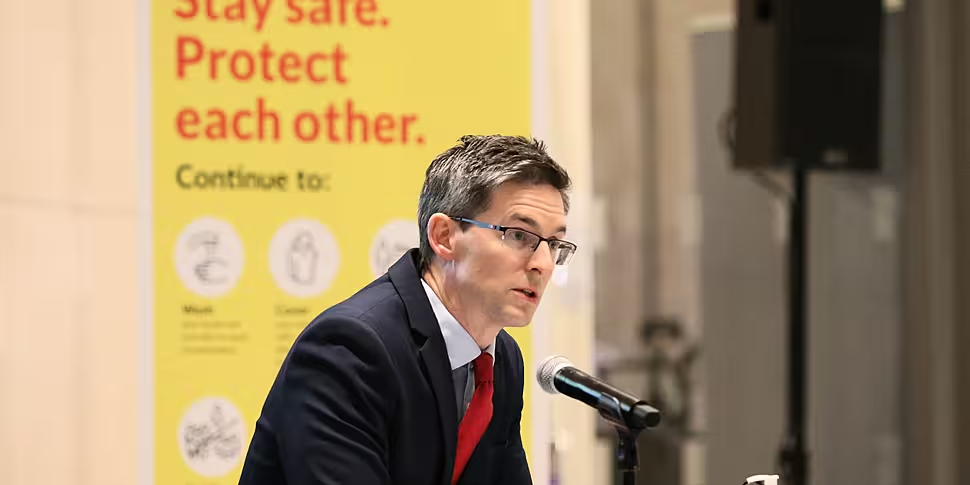There have been 28 additional deaths related to COVID-19 and 3,955 new confirmed cases here.
The Health Protection Surveillance Centre (HPSC) says 26 of these deaths happened in January.
While the date of death for two others remains under investigation.
There has been a total of 2,488 COVID-19 related deaths in Ireland and 163,057 confirmed cases.
These figures include the denotification of 42 confirmed cases.
Of the cases notified on Thursday:
- 1,826 are men / 2,115 are women
- 54% are under 45 years of age
- The median age is 42 years old
Some 1,210 cases are in Dublin, 456 in Cork, 235 in Louth, 221 in Meath and 218 in Limerick.
The remaining 1,615 cases are spread across all other counties.
As of 2.00pm, 1,789 COVID-19 patients are hospitalised - of which 169 are in ICU.
There have been 154 additional hospitalisations in the past 24 hours.
Dr Tony Holohan, Chief Medical Officer, said: "Today we are giving some more information on the 208 people who have been reported to have sadly died from COVID-19 so far this month.
"Of these, 23 cases have been linked to outbreaks in hospitals and 38 with outbreaks in nursing homes.
"The ages of those who have died range from 25 to 98 years. Every death associated with COVID-19 is a tragedy.
"We must cut our social contacts in order to break the chains of transmission and protect those who are most vulnerable to this disease. Stay at home and save lives."
Deputy Chief Medical Officer, Dr Ronan Glynn, said: "COVID-19 is having a very significant impact on our health system.
"The best way we can protect ourselves and each other is by staying home and only leaving home for essential journeys.
"We have the power to change the trajectory of the disease in our communities. We must hold firm and continue to stay home."
'Multiple different variants'
While Professor Philip Nolan, Chair of the Irish Epidemiological Modelling Advisory Group, explained: "From an epidemiological perspective, what we are seeing in this wave is different to what we have seen since springtime, and perhaps worse.
"The penetration of the virus throughout all ages of the population is a particular cause for serious concern, as is risk of severe disease that all of these people face.
"Poor health outcomes, risk of serious or long-term illness and hospitalisation remain a risk for us all when it comes to COVID-19.
"That is why we must follow public health advice and protect not only ourselves but our hospital system and healthcare workers by staying at home."
And Dr Cillian De Gascun, director of the National Virus Reference Laboratory, said: "It is not unusual for viruses to mutate over time.
"We have identified multiple different SARS-CoV-2 lineages in Ireland since the start of the pandemic, and two of the three recently emerged variants of concern from the UK and South Africa.
"We also expect that more variants will emerge across the world in the coming months.
"While some of the new variants will increase the risk of becoming infected because they have increased transmissibility - they can stick longer and better to surfaces - this does not mean that our continued adherence to the public health advice is in anyway less effective.
"We must continue to wash our hands, wear a face covering where appropriate, maintain our social distance and continue to adhere to the public health advice."
Liam Woods is the HSE's director of acute hospitals: "Our hospitals and our frontline healthcare workers are working under the enormous strain COVID-19 is exerting on our health service.
"1,789 patients are in hospital with COVID-19, 169 of those in intensive care.
"The best way we can protect our health service and support our frontline workers is to stay home and continue to adhere to the public health advice."
Vaccine figures
It has been revealed that more than 77,000 people have been vaccinated against COVID-19 as of Wednesday.
Some 4,000 people have been trained to issue vaccines in anticipation of a further roll-out of the vaccination programme.
The chief executive of the Health Service Executive (HSE), Paul Reid, earlier outlined the breakdown of who has been vaccination so far.
"Cumulative as of today, there's now 77,300 vaccinations completed", he said.
He explained this breaks down as 69,378 frontline healthcare workers vaccinated, and 7,925 in long-term care facilities.
This includes residents and staff.









